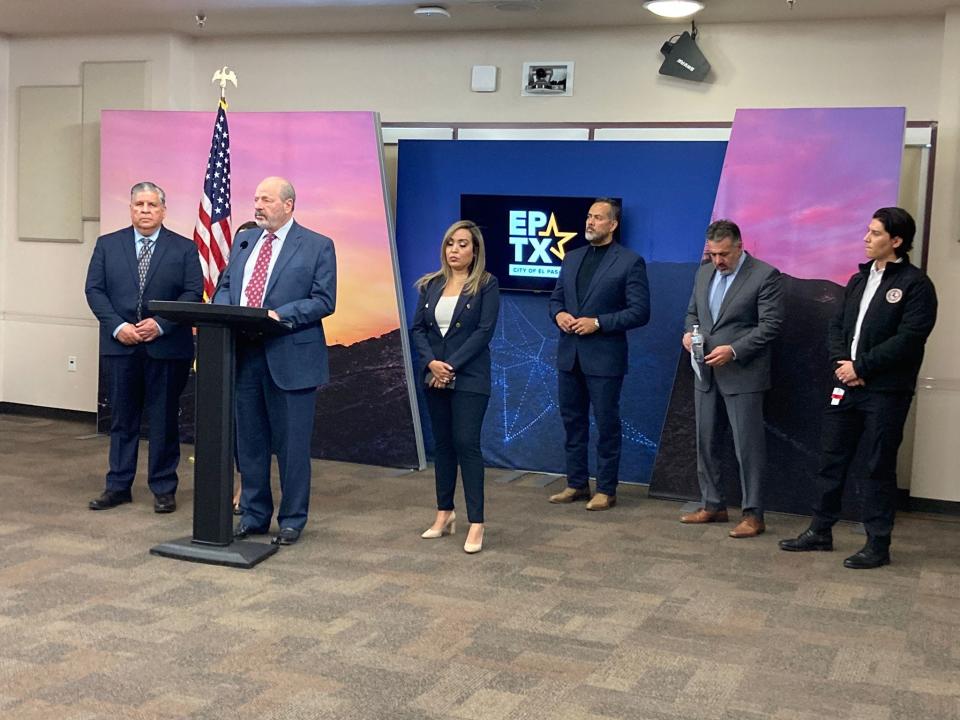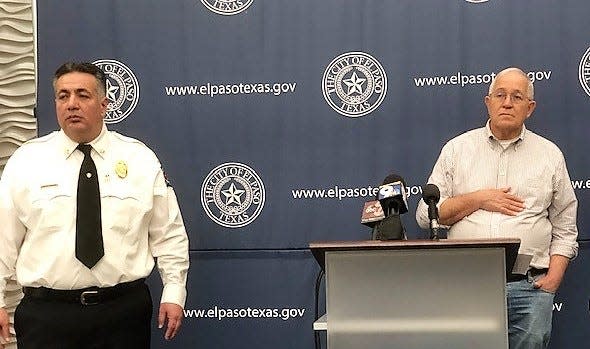El Paso officials say US Supreme Court ruling on Title 42 does not alter city's strategy
- Oops!Something went wrong.Please try again later.
City officials said Tuesday’s U.S. Supreme Court ruling that keeps Title 42 in place for now does not change their strategy for handling the large number of migrants arriving in El Paso.
The Supreme Court ruled Tuesday afternoon that Title 42 would remain in place for the time being and called for a hearing in February. Even with Title 42 in place, Customs and Border Protection encounters with migrants in the El Paso area have consistently topped 1,000 a day in recent weeks.
The city and nonprofit and faith-based organizations are working to provide shelter for the hundreds of migrants and asylum-seekers CBP is releasing into the community who cannot be expelled under Title 42.
In the more than two and a half years that Title 42 has been in effect, U.S. Customs and Border Protection’s enforcement of the policy has shifted from a blanket prohibition on asylum-seekers entering the country to a patchwork of carve-outs.
The Biden administration has exempted unaccompanied minors and those deemed to be vulnerable from the policy. Title 42 is most consistently enforced for nationalities that the U.S. can expel to Mexico, including Mexicans, Hondurans, Salvadorans and Guatemalans.
Cubans and Nicaraguans are often allowed into the U.S. because Mexico does not accept their expulsions and the U.S. has a limited ability to deport them by plane.
Venezuelans were able to enter the U.S. despite Title 42 until Mexico agreed to accept Venezuelans expelled at the border in October.
“The decision today does not change our strategy in dealing with this humanitarian crisis,” Mayor Oscar Leeser said Tuesday in an emailed statement. “We will continue to work with all our partners to ensure that each individual is treated with dignity and respect, while following the laws of the United States.”
More:US Supreme Court keeps Title 42 in place as temporary stay is extended
Deputy City Manager Mario D'Agostino said that after a dip over the weekend, the number of migrant encounters rose again on Monday, indicating the number of migrants arriving in El Paso would continue even with the Supreme Court ruling.
Title 42 is a public health law that grants federal authorities the power to deny entry to the U.S. to prevent the spread of diseases. The Trump administration began using Title 42 in March 2020 to expel people arriving at the border seeking asylum. The Biden administration announced plans in April 2022 to end Title 42, but a protracted legal battle has delayed the end date several times.
City of El Paso's efforts to help migrants continue
D’Agostino spoke to reporters in a virtual conference Tuesday afternoon, stating that the court’s decision meant more of the same for El Paso.
“The city continues with all the efforts we have been doing,” he said, noting the shelter at the convention center, transportation services to bus stations and the airport, and the bus stationed Downtown as a warming center for migrants staying on the street.

Leeser did not appear at the news conference but sent an emailed statement Tuesday evening.
“The numbers have been high since August, and Title 42 has been in place during that time,” he said. “We anticipate the numbers to remain the same, but again, each day is fluid and can change in a heartbeat.”

D'Agostino said many migrants are reluctant to stay at city-run shelters and continue to sleep on the streets. People continue to congregate on sidewalks outside Sacred Heart Church in Segundo Barrio.
Public Health Authority Dr. Hector Ocaranza defended the decision to clear clothes and blankets that had accumulated outside the church on Monday. He said items piling up could become a vector for infectious diseases.
"This is not a form of aggression, this is a form of protection," Ocaranza said.
D’Agostino said the city and nonprofits are distributing fresh blankets. He said city employees and clergy members are encouraging everyone to sleep in shelters, but many people are concerned about the risk of immigration enforcement.
“The best I can say is they are scared,” he said. “They have taken a tremendous journey to get where they are … and now that they are here and they don’t have the legal paper to be here, they are just concerned about that.”
Most migrants arriving in El Paso have been processed by CBP and released into the community. D’Agostino said those who crossed the border and evaded Border Patrol agents are in the minority.
“As far as the vast majority who have been crossing through in the last several weeks, I can see that holding,” D’Agostino said.
More:What is Title 42, when does it end, how does it impact US-Mexico border? Here's what to know
This article originally appeared on El Paso Times: El Paso officials: Supreme Court Title 42 ruling doesn't alter actions

